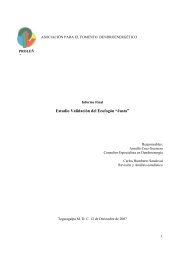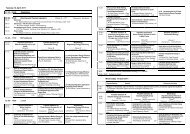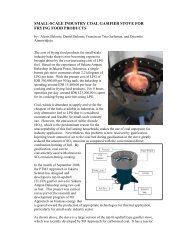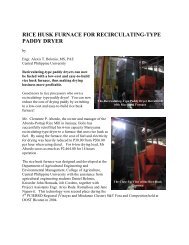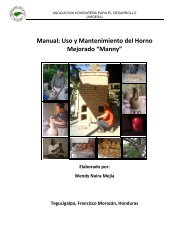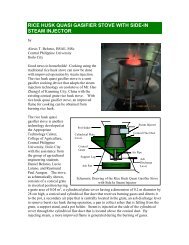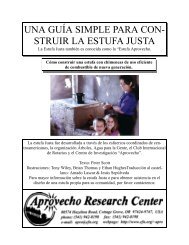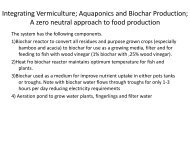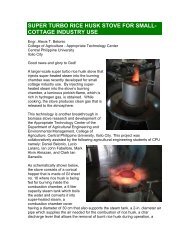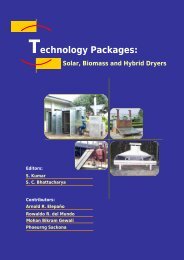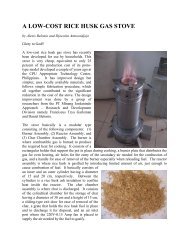U.S.-FocUSed Biochar report - BioEnergy Lists
U.S.-FocUSed Biochar report - BioEnergy Lists
U.S.-FocUSed Biochar report - BioEnergy Lists
You also want an ePaper? Increase the reach of your titles
YUMPU automatically turns print PDFs into web optimized ePapers that Google loves.
tional energy so greenhouse gas (GHG) emissions are dramatically reduced during the conversion of biomassto biochar. This soil-enhancing product also sequesters carbon long-term when returned to the soil, which canthereby increase the production of biomass. Thus, biochar offers greater energy capture (efficiency), a carbonnegativelife-cycle assessment 13 and a marked reduction in GHG emissions.The biochar community is seeking strong sustainability guidelines to ensure that this very promising processdoes not get derailed by concerns (legitimate or perceived) over biomass sustainability. Fortunately, biomassuse supporters, conservationists and social equity groups, working together to develop standards and guidelines,have accomplished significant work to date. <strong>Biochar</strong> practitioners and promoters can adopt some of the excellentprotocols that have already been developed on biomass sustainability generically. Of important note are sustainabilitystandards drafted by the Pacific Northwest <strong>Biochar</strong> Initiative.To this end, the rest of this section of this <strong>report</strong> will summarize the approach and results achieved by severalgroups and organizations in the quest to develop sustainability guidelines for biomass use or for certificationprograms for ensuring sustainable use that will be most suitable for the biochar community.International Sustainability Certification & GuidelinesRoundtable on Sustainable Biofuels (RSB): The RSB is a project of the National Polytechnic School of Lausanne,France, with a mission to ensure that biofuels deliver on their promise of sustainability. 14 The following, in italics,is directly quoted from the <strong>report</strong>.Objectives of the RSB Certification SystemsThe RSB certification systems provide a comprehensive process for verification of compliance with the RSB standardsfor responsibly produced, processed and traded biomass/biofuels. The RSB certification systems facilitatethe comprehensive, consistent, credible, transparent, effective and efficient implementation of RSB’s principles andcriteria and RSB standards for production, processing, conversion, trade and use of biomass/biofuels.It is designed to provide:• flexible, effective and efficient approaches to implementation of RSB principles and criteria;• a performance, stability and risk management-based compliance management system;• consistent, credible and transparent verification of the implementation of the RSB principles & criteria;• comprehensive, consistent, credible and transparent compliance with international norms;• tangible benefits for using certified biofuels,• incentives for participants to perform in a responsible way, and to• facilitate market access, where market regulations call for sustainability criteria for biofuelsThe RSB relies on the European Union’s (EU) sustainability criteria for the use of biomass (for biofuels and bioliquidsspecifically but apply broadly to all biomass use) as defined in the Renewable Energy Directive (RED),published in the Official Journal of the EU, June 2009. 15 It covers six areas of sustainability in detail along with<strong>report</strong>ing requirements and methodologies for quantifying GHG reductions. Very broadly, those are:1. Meet a 35% reduction goal for GHG emissions due to biomass replacing business-as-usual fossil fuel use.2. Biomass shall not come from lands of high biodiversity value (in certain forests, grasslands and uniqueareas).13 Roberts, Kelli, et.al., “Life Cycle Assessment of <strong>Biochar</strong> Systems: Estimating the Energetic, Economic and Climate ChangePotential” , Environmental Science and Technology, Vol. 44, No. 2, 2010. http://www.css.cornell.edu/faculty/lehmann/publ/ES&T%2044,%20827-833,%202010%20Roberts.pdf14 Roundtable on Sustainable Biofuels, “Introduction to the RSB Certification Systems”. Technical Draft, RSB reference code:RSB-DOC-00-001. March 2010 http://cgse.epfl.ch/page85866.html15 Official Journal of the European Union, “Directive 2009/28/ED of the European Parliament and of the Council of 23 April2009” http://eur-lex.europa.eu/LexUriServ/LexUriServ.do?uri=OJ:L:2009:140:0016:0062:EN:PDF<strong>Biochar</strong> sustainability in: <strong>Biochar</strong> and Sustainable Practices45



